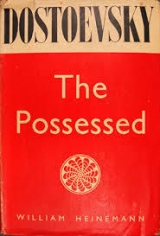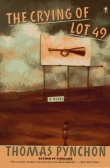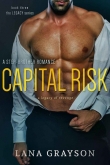
Текст книги "The Possessed"
Автор книги: Федор Достоевский
сообщить о нарушении
Текущая страница: 41 (всего у книги 49 страниц)
“No, excuse me; I can't undertake such a ... I decline.”
“You'll take it all the same. I am acting on the instructions of the central committee, and you are bound to obey.”
“And I consider that our centres abroad have forgotten what Russia is like and have lost all touch, and that's why they talk such nonsense. ... I even think that instead of many hundreds of quintets in Russia, we are the only one that exists, and there is no network at all,” Liputin gasped finally.
“The more contemptible of you, then, to run after the cause without believing in it ... and you are running after me now like a mean little cur.”
“No, I'm not. We have a full right to break off and found a new society.”
“Fool!” Pyotr Stepanovitch boomed at him threateningly all of a sudden, with flashing eyes.
They stood facing one another for some time. Pyotr Stepanovitch turned and pursued his way confidently.
The idea flashed through Liputin's mind, “Turn and go back; if I don't turn now I shall never go back.” He pondered this for ten steps, but at the eleventh a new and desperate idea flashed into his mind: he did not turn and did not go back.
They were approaching Filipov's house, but before reaching it they turned down a side street, or, to be more accurate, an inconspicuous path under a fence, so that for some time they had to walk along a steep slope above a ditch where they could not keep their footing without holding the fence. At a dark corner in the slanting fence Pyotr Stepanovitch took out a plank, leaving a gap, through which he promptly scrambled. Liputin was surprised, but he crawled through after him; then they replaced the plank after them. This was the secret way by which Fedka used to visit Kirillov.
“Shatov mustn't know that we are here,” Pyotr Stepanovitch whispered sternly to Liputin.
III
Kirillov was sitting on his leather sofa drinking tea, as he always was at that hour. He did not get up to meet them, but gave a sort of start and looked at the new-comers anxiously.
“You are not mistaken,” said Pyotr Stepanovitch, “it's just that I've come about.”
“To-day?”
“No, no, to-morrow ... about this time.” And he hurriedly sat down at the table, watching Kirillov's agitation with some uneasiness. But the latter had already regained his composure and looked as usual.
“These people still refuse to believe in you. You are not vexed at my bringing Liputin?”
“To-day I am not vexed; to-morrow I want to be alone.”
“But not before I come, and therefore in my presence.” .
“I should prefer not in your presence.”
“You remember you promised to write and to sign all I dictated.”
“I don't care. And now will you be here long?”
“I have to see one man and to remain half an hour, so whatever you say I shall stay that half-hour.”
Kirillov did not speak. Liputin meanwhile sat down on one side under the portrait of the bishop. That last desperate idea gained more and more possession of him. Kirillov scarcely noticed him. Liputin had heard of Kirillov's theory before and always laughed at him; but now he was silent and looked gloomily round him.
“I've no objection to some tea,” said Pyotr Stepanovitch, moving up. “I've just had some steak and was reckoning on getting tea with you.”
“Drink it. You can have some if you like.”
“You used to offer it to me,” observed Pyotr Stepanovitch sourly.
“That's no matter. Let Liputin have some too.”
“No, I ... can't.”
“Don't want to or can't?” said Pyotr Stepanovitch, turning quickly to him.
“I am not going to here,” Liputin said expressively.
Pyotr Stepanovitch frowned.
“There's a flavour of mysticism about that; goodness knows what to make of you people!”
No one answered; there was a full minute of silence.
“But I know one thing,” he added abruptly, “that no superstition will prevent any one of us from doing his duty.”
“Has Stavrogin gone?” asked Kirillov.
“Yes.”
“He's done well.”
Pyotr Stepanovitch's eyes gleamed, but he restrained himself.
“I don't care what you think as long as every one keeps his word.”
“I'll keep my word.”
“I always knew that you would do your duty like an independent and progressive man.”
“You are an absurd fellow.”
“That may be; I am very glad to amuse you. I am always glad if I can give people pleasure.”
“You are very anxious I should shoot myself and are afraid I might suddenly not?”
“Well, you see, it was your own doing – connecting your plan with our work. Reckoning on your plan we have already done something, so that you couldn't refuse now because you've let us in for it.”
“You've no claim at all.”
“I understand, I understand; you are perfectly free, and we don't come in so long as your free intention is carried out.”
“And am I to take on myself all the nasty things you've done?”
“Listen, Kirillov, are you afraid? If you want to cry off, say so at once.”
“I am not afraid.”
“I ask because you are making so many inquiries.”
“Are you going soon?”
“Asking questions again?” Kirillov scanned him contemptuously.
“You see,” Pyotr Stepanovitch went on, getting angrier and angrier, and unable to take the right tone, “you want me to go away, to be alone, to concentrate yourself, but all that's a bad sign for you – for you above all. You want to think a great deal. To my mind you'd better not think. And really you make me uneasy.”
“There's only one thing I hate, that at such a moment I should have a reptile like you beside me.”
“Oh, that doesn't matter. I'll go away at the time and stand on the steps if you like. If you are so concerned about trifles when it comes to dying, then . . . it's all a very bad sign. I'll go out on to the steps and you can imagine I know nothing about it, and that I am a man infinitely below you.”
“No, not infinitely; you've got abilities, but there's a lot you don't understand because you are a low man.”
“Delighted, delighted. I told you already I am delighted to provide entertainment ... at such a moment.”
“You don't understand anything.”
“That is, I ... well, I listen with respect, anyway.”
“You can do nothing; even now you can't hide your petty spite, though it's not to your interest to show it. You'll make me cross, and then I may want another six months.” Pyotr Stepanovitch looked at his watch. “I never understood your theory, but I know you didn't invent it for our sakes, so I suppose you would carry it out apart from us. And I know too that you haven't mastered the idea but the idea has mastered you, so you won't put it off.”
“What? The idea has mastered me?”
“Yes.”
“And not I mastered the idea? That's good. You have a little sense. Only you tease me and I am proud.”
“That's a good thing, that's a good thing. Just what you need, to be proud.”
“Enough. You've drunk your tea; go away.”
“Damn it all, I suppose I must”– Pyotr Stepanovitch got up —“ though it's early. Listen, Kirillov. Shall I find that man – you know whom I mean – at Myasnitchiha's? Or has she too been lying?”
“You won't find him, because he is here and not there.”
“Here! Damn it all, where?”
“Sitting in the kitchen, eating and drinking.”
“How dared he?” cried Pyotr Stepanovitch, flushing angrily. “It was his duty to wait . . . what nonsense! He has no passport, no money!”
“I don't know. He came to say good-bye; he is dressed and ready. He is going away and won't come back. He says you are a scoundrel and he doesn't want to wait for your money.”
“Ha ha! He is afraid that I'll . . . But even now I can . . . if ... Where is he, in the kitchen?”
Kirillov opened a side door into a tiny dark room; from this room three steps led straight to the part of the kitchen where the cook's bed was usually put, behind the partition. Here, in the corner under the ikons, Fedka was sitting now, at a bare deal table. Before him stood a pint bottle, a plate of bread, and some cold beef and potatoes on an earthenware dish. He was eating in a leisurely way and was already half drunk, but he was wearing his sheep-skin coat and was evidently ready for a journey. A samovar was boiling the other side of the screen, but it was not for Fedka, who had every night for a week or more zealously blown it up and got it ready for “Alexey Nilitch, for he's such a habit of drinking tea at nights.” I am strongly disposed to believe that, as Kirillov had not a cook, he had cooked the beef and potatoes that morning with his own hands for Fedka.
“What notion is this?” cried Pyotr Stepanovitch, whisking into the room. “Why didn't you wait where you were ordered?”
And swinging his fist, he brought it down heavily on the table.
Fedka assumed an air of dignity.
“You wait a bit, Pyotr Stepanovitch, you wait a bit,” he began, with a swaggering emphasis on each word, “it's your first duty to understand here that you are on a polite visit to Mr. Kirillov, Alexey Nilitch, whose boots you might clean any day, because beside you he is a man of culture and you are only – foo!”
And he made a jaunty show of spitting to one side. Haughtiness and determination were evident in his manner, and a certain very threatening assumption of argumentative calm that suggested an outburst to follow. But Pyotr Stepanovitch had no time to realise the danger, and it did not fit in with his preconceived ideas. The incidents and disasters of the day had quite turned his head. Liputin, at the top of the three steps, stared inquisitively down from the little dark room.
“Do you or don't you want a trustworthy passport and good money to go where you've been told? Yes or no?”
“D'you see, Pyotr Stepanovitch, you've been deceiving me from the first, and so you've been a regular scoundrel to me. For all the world like a filthy human louse – that's how I look on you. You've promised me a lot of money for shedding innocent blood and swore it was for Mr. Stavrogin, though it turns out to be nothing but your want of breeding. I didn't get a farthing out of it, let alone fifteen hundred, and Mr. Stavrogin hit you in the face, which has come to our ears. Now you axe threatening me again and promising me money – what for, you don't say. And I shouldn't wonder if you are sending me to Petersburg to plot some revenge in your spite against Mr. Stavrogin, Nikolay Vsyevolodovitch, reckoning on my simplicity. And that proves you are the chief murderer. And do you know what you deserve for the very fact that in the depravity of your heart you've given up believing in God Himself, the true Creator? You are no better than an idolater and are on a level with the Tatar and the Mordva. Alexey Nilitch, who is a philosopher, has expounded the true God, the Creator, many a time to you, as well as the creation of the world and the fate that's to come and the transformation of every sort of creature and every sort of beast out of the Apocalypse, but you've persisted like a senseless idol in your deafness and your dumbness and have brought Ensign Erkel to the same, like the veriest evil seducer and so-called atheist. ...”
“Ah, you drunken dog! He strips the ikons of their setting and then preaches about God!”
“D'you see, Pyotr Stepanovitch, I tell you truly that I have stripped the ikons, but I only took out the pearls; and how do you know? Perhaps my own tear was transformed into a pearl in the furnace of the Most High to make up for my sufferings, seeing I am just that very orphan, having no daily refuge. Do you know from the books that once, in ancient times, a merchant with just such tearful sighs and prayers stole a pearl from the halo of the Mother of God, and afterwards, in the face of all the people, laid the whole price of it at her feet, and the Holy Mother sheltered him with her mantle before all the people, so that it was a miracle, and the command was given through the authorities to write it all down word for word in the Imperial books. And you let a mouse in, so you insulted the very throne of God. And if you were not my natural master, whom I dandled in my arms when I was a stripling, I would have done for you now, without budging from this place!”
Pyotr Stepanovitch flew into a violent rage.
“Tell me, have you seen Stavrogin to-day?”
“Don't you dare to question me. Mr. Stavrogin is fairly amazed at you, and he had no share in it even in wish, let alone instructions or giving money. You've presumed with me.”
“You'll get the money and you'll get another two thousand in Petersburg, when you get there, in a lump sum, and you'll get more.”
“You are lying, my fine gentleman, and it makes me laugh to see how easily you are taken in. Mr. Stavrogin stands at the top of the ladder above you, and you yelp at him from below like a silly puppy dog, while he thinks it would be doing you an honour to spit at you.”
“But do you know,” cried Pyotr Stepanovitch in a rage, “that I won't let you stir a step from here, you scoundrel, and I'll hand you straight over to the police.”
Fedka leapt on to his feet and his eyes gleamed with fury. Pyotr Stepanovitch pulled out his revolver. Then followed a rapid and revolting scene: before Pyotr Stepanovitch could take aim, Fedka swung round and in a flash struck him on the cheek with all his might. Then there was the thud of a second blow, a third, then a fourth, all on the cheek. Pyotr Stepanovitch was dazed; with his eyes starting out of his head, he muttered something, and suddenly crashed full length to the ground.
“There you are; take him,” shouted Fedka with a triumphant swagger; he instantly took up his cap, his bag from under the bench, and was gone. Pyotr Stepanovitch lay gasping and . unconscious. Liputin even imagined that he had been murdered. Kirillov ran headlong into the kitchen.
“Water!” he cried, and ladling some water in an iron dipper from a bucket, he poured it over the injured man's head. Pyotr Stepanovitch stirred, raised his head, sat up, and looked blankly about him.
“Well, how are you?” asked Kirillov. Pyotr Stepanovitch looked at him intently, still not recognising him; but seeing Liputin peeping in from the kitchen, he smiled his hateful smile and suddenly got up, picking up his revolver from the floor.
“If you take it into your head to run away to-morrow like that scoundrel Stavrogin,” he cried, pouncing furiously on Kirillov, pale, stammering, and hardly able to articulate his words, “I'll hang you . . . like a fly ... or crush you . . . if it's at the other end of the world ... do you understand!”
And he held the revolver straight at Kirillov's head; but almost at the same minute, coming completely to himself, he drew back his hand, thrust the revolver into his pocket, and without saying another word ran out of the house. Liputin followed him. They clambered through the same gap and again walked along the slope holding to the fence. Pyotr Stepanovitch strode rapidly down the street so that Liputin could scarcely keep up with him. At the first crossing he suddenly stopped.
“Well?” He turned to Liputin with a challenge.
Liputin remembered the revolver and was still trembling all over after the scene he had witnessed; but the answer seemed to come of itself irresistibly from his tongue:
“I think ... I think that . . .”
“Did you see what Fedka was drinking in the kitchen?”
“What he was drinking? He was drinking vodka.”
“Well then, let me tell you it's the last time in his life he will drink vodka. I recommend you to remember that and reflect on it. And now go to hell; you are not wanted till to-morrow. But mind now, don't be a fool!”
Liputin rushed home full speed.
IV
He had long had a passport in readiness made out in a false name. It seems a wild idea that this prudent little man, the petty despot of his family, who was, above all things, a sharp man of business and a capitalist, and who was an official too (though he was a Fourierist), should long before have conceived the fantastic project of procuring this passport in case of emergency, that he might escape abroad by means of it if . . .he did admit the possibility of this if,though no doubt he was never able himself to formulate what this ifmight mean.
But now it suddenly formulated itself, and in a most unexpected way. That desperate idea with which he had gone to Kirillov's after that “fool” he had heard from Pyotr Stepanovitch on the pavement, had been to abandon everything at dawn next day and to emigrate abroad. If anyone doubts that such fantastic incidents occur in everyday Russian life, even now, let him look into the biographies of all the Russian exiles abroad. Not one of them escaped with more wisdom or real justification. It has always been the unrestrained domination of phantoms and nothing more.
Running home, he began by locking himself in, getting out his travelling bag, and feverishly beginning to pack. His chief anxiety was the question of money, and how much he could rescue from the impending ruin – and by what means. He thought of it as “rescuing,” for it seemed to him that he could not linger an hour, and that by daylight he must be on the high road. He did not know where to take the train either; he vaguely determined to take it at the second or third big station from the town, and to make his way there on foot, if necessary. In that way, instinctively and mechanically he busied himself in his packing with a perfect whirl of ideas in his head – and suddenly stopped short, gave it all up, and with a deep groan stretched himself on the sofa.
He felt clearly, and suddenly realised that he might escape, but that he was by now utterly incapable of deciding whether he ought to make off beforeor afterShatov's death; that he was simply a lifeless body, a crude inert mass; that he was being moved by an awful outside power; and that, though he had a passport to go abroad, that though he could run away from Shatov (otherwise what need was there of such haste?), yet he would run away, not from Shatov, not before his murder, but afterit, and that that was determined, signed, and sealed.
In insufferable distress, trembling every instant and wondering at himself, alternately groaning aloud and numb with terror, he managed to exist till eleven o'clock next morning locked in and lying on the sofa; then came the shock he was awaiting, and it at once determined him. When he unlocked his door and went out to his household at eleven o'clock they told him that the runaway convict and brigand, Fedka, who was a terror to every one, who had pillaged churches and only lately been guilty of murder and arson, who was being pursued and could not be captured by our police, had been found at daybreak murdered, five miles from the town, at a turning off the high road, and that the whole town was talking of it already. He rushed headlong out of the house at once to find out further details, and learned, to begin with, that Fedka, who had been found with his skull broken, had apparently been robbed and, secondly, that the police already had strong suspicion and even good grounds for believing that the murderer was one of the Shpigulin men called Tomka, the very one who had been his accomplice in murdering the Lebyadkins and setting fire to their house, and that there had been a quarrel between them on the road about a large sum of money stolen from Lebyadkin, which Fedka was supposed to have hidden. Liputin ran to Pyotr Stepanovitch's lodgings and succeeded in learning at the back door, on the sly, that though Pyotr Stepanovitch had not returned home till about one o'clock at night, he had slept there quietly all night till eight o'clock next morning. Of course, there could be no doubt that there was nothing extraordinary about Fedka's death, and that such careers usually have such an ending; but the coincidence of the fatal words that “it was the last time Fedka would drink vodka,” with the prompt fulfilment of the prediction, was so remarkable that Liputin no longer hesitated. The shock had been given; it was as though a stone had fallen upon him and crushed him for ever. Returning home, he thrust his travelling-bag under the bed without a word, and in the evening at the hour fixed he was the first to appear at the appointed spot to meet Shatov, though it's true he still had his passport in his pocket.
Last updated on Wed Jan 12 09:26:22 2011 for eBooks@Adelaide.








